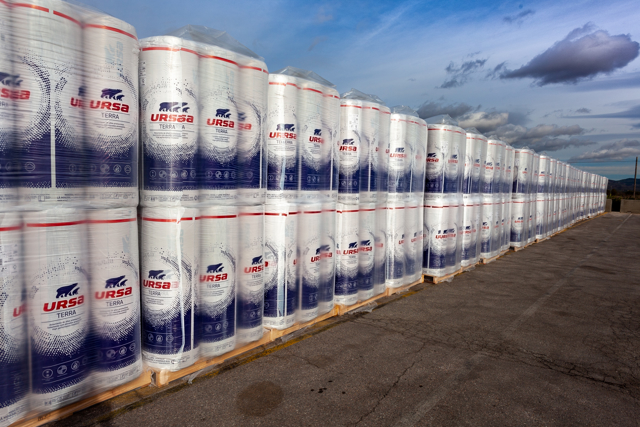
Crafting a positive impact for future generations
Our mission as a European insulation supplier: to have a lasting positive impact on people, society, and the environment.
Sustainability is ingrained in our DNA, and at URSA we demonstrate this every day. With our insulation solutions, we improve the energy efficiency of buildings and reduce the carbon footprint of individuals, companies, and ourselves. We work with recycled materials to produce glass mineral wool. Our products are recyclable, and we keep our CO2 emissions as low as possible.
We also look for solutions with minimal environmental impact during transport and in the handling of packaging . In this way, we not only achieve our own climate goals, but also support our customers in achieving their ambitions. This allows us to put into practice our mission to make a lasting positive impact on people, society, and the environment. Together, we are building a better future.
recycled glass content in our glass mineral wool products
recycled plastic in primary packaging at multiple production plants
of pallets recovered in Eastern Europe

Many of our products involve thermal processes, decarbonisation is therefore a high priority to achieve our sustainability objectives, reducing Scope 1 & 2 emissions by 35% by 2030.

Circular economy is ingrained in our DNA, and at URSA we demonstrate this every day. We work with recycled materials to produce glass wool.

URSA is leading the charge in global sustainability, offering solutions that have been proven to make a real impact.
URSA prioritises the use of locally sourced raw materials, incorporating high amounts of recycled content in our glass mineral wool products. The inclusion of recycled glass significantly reduces the energy required for manufacturing glass wool, leading to lower CO₂ emissions compared to the use of virgin raw materials.

Aligned with our ESG action plan objectives, we have implemented energy efficiency measures across all our manufacturing plants. These initiatives include optimising energy consumption, upgrading to more energy-efficient equipment, and enhancing the overall energy performance of our facilities.
Additionally, we are committed to minimising production waste and continuously increasing our recycling rates. This effort reduces our reliance on virgin raw materials.

The high compressibility of URSA’s glass mineral wool plays a key role in reducing CO₂ emissions during transportation. Rolls can be compressed more than 10 times, significantly increasing loading capacity and warehouse storage efficiency while improving transport logistics and reducing environmental impact.

URSA integrates eco-design principles into its products, significantly reducing waste on construction sites. Thanks to their lightness and ease of handling, our insulation materials can contribute to faster installation times.

URSA's durable products require no maintenance for the life span of the building, which is typically 50 years, and up to 600 times* the energy used in their manufacture, transport, and installation. They reduce building energy demand, particularly for heating and cooling, which can help lower energy consumption. In addition to cost and energy savings, our materials enhance comfort and help combat climate change by reducing CO2 emissions.
*depending on the thickness of the product, the application and the lifespan of the building.

There are different scenarios for end of life, depending on each product and its final application during the use phase. URSA’s glass mineral wool is 100% recyclable so cutoffs generated during manufacturing or construction projects can be collected, reprocessed and transformed into new products.

URSA’s insulation materials rank highly on sustainability parameters. This has been externally verified, and we have received several international certificates and awards from various bodies for our insulation materials’ unique benefits.
View all Certificates and Recognitions
As a brand of Etex, URSA's sustainability credentials are featured in the reports outlined above, within the Insulation division.